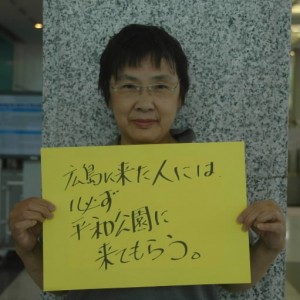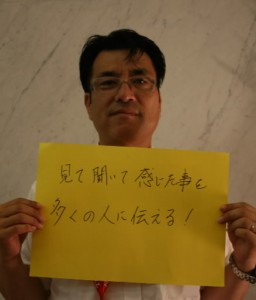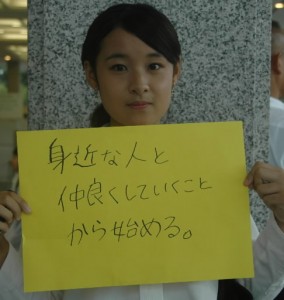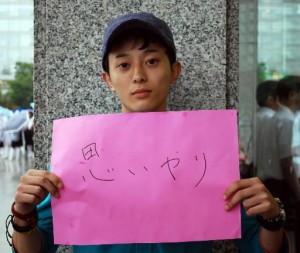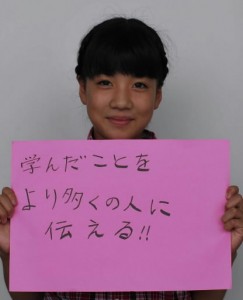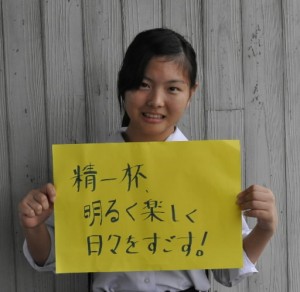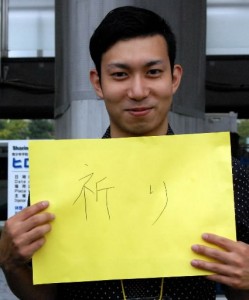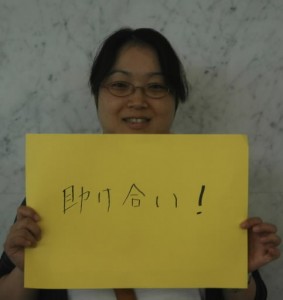Peace Seeds: Hiroshima Teens Report on Peace Issues, Part 7
Aug. 12, 2014
Survey conducted on August 6 asked people what they can do for peace
The junior writers for the Chugoku Shimbun carried out a survey on the topic of peace on August 6, the anniversary of the atomic bombing of Hiroshima. A total of 222 people (195 from Japan and 27 from overseas) offered responses, from elementary school children to people in their 90s. They had come to Hiroshima Peace Memorial Park, located in Naka Ward, in connection with the annual Peace Memorial Ceremony.
The junior writers asked the visitors such questions as why they had decided to come to Peace Memorial Park, what their impressions of the day were, and whether Japan, as a nation, is heading in a peaceful direction. They also asked the visitors to write on a slip of pink or yellow paper what they could do to promote peace, and took photos of them with these resolutions.
The junior writers hope that the visitors will take with them what they felt in the A-bombed city of Hiroshima on August 6, carry it forward in their lives, and convey it to other people.
by Daichi Ishii, a third-year high school student
Many people said it is important for each one of us to think about war and the atomic bombings. Miyu Ashizawa, 13, a second-year junior high school student from Tama City, Tokyo, wrote, “I would like to reflect on war, without setting it aside as something that happened in the past.”
Many also said that they want to convey Hiroshima’s message to the world. Steven Junior, 21, from Indonesia, wrote, “I plan to talk about Hiroshima and Nagasaki to people back home. I want to tell them that war only creates suffering.” Lea Wolfs from Germany, a senior in high school, wrote, “I won’t hold any prejudice against other people.” Akari Matsumura, 17, a second-year high school student from Asaminami Ward, Hiroshima, wrote in big letters, “Each of us must care for others.”
“Why did you decide to come to Hiroshima Peace Memorial Park?” and “What are your impressions?”
“The atomic bomb had enormous power.”
by Yuka Ichimura, a third-year high school student
To the question of why they visited the park, many said, “To pray for the repose of those who died in the atomic bombing,” and “To learn about the atomic bombing.” They also said, “I now understand the importance of peace and of protecting peace.” Kosei Yamada, 10, a fourth grader from Ichinomiya City, Aichi Prefecture, said he had read the manga series Barefoot Gen, by the late Keiji Nakazawa, before coming to Hiroshima. He said, “When I saw the heavy damage done to the A-bomb Dome, I felt the atomic bomb had enormous power.”
Shoko Otani, 39, a housewife from Fukuoka City, said she sensed that the memories of the atomic bombings and World War II are fading more in Fukuoka than in Hiroshima and that she once again felt the importance of conveying what happened here to future generations. Justine Fish, 26, from the United Kingdom, said she was shocked by the destruction caused by the atomic bomb and that she respects the people of Hiroshima.
“Do you think Japan is moving in a peaceful direction?”
53.2 percent said “no,” with a higher percentage among the Japanese
by Yumi Kimura, a third-year high school student
Of the 222 people who responded to the survey, 86 (38.7%) said “yes”; 118 (53.2%) said “no”; and 18 (8.1%) did not answer. The percentage of those who said “yes” was higher among those from overseas and lower among Japanese people.
Among those who said “yes,” many said that Japan has not engaged in war for the last 69 years. Emil Leffler, 18, a third-year high school student from Sweden, said, “I say ‘yes’ because Japan is conveying the horror of the atomic bombings to the world.” There were also those who expressed high hopes for the peace activities pursued by young people. Others mentioned that there is peace within Japan.
Around 90 percent of those who said ‘no’ expressed concern over the current government’s decision to approve the right to exercise collective self-defense by changing the interpretation of the Constitution. Others mentioned deteriorating relations with South Korea and China over territorial issues. Some pointed out problems they witness around them, including bullying. Megumi Matsumoto, 16, a second-year high school student from Etajima City, said, “There are many people who are influenced by others and don’t have their own opinions.”
These 26 junior writers were involved in producing this article: Yumi Kimura, Yuka Ichimura, Daichi Ishii (third-year high school students); Arata Kono, Yuri Ryokai, Satoko Hirata (second-year high school students); Kantaro Matsuo, Takeshi Iwata, Shino Taniguchi, Moe Nakano, Ishin Nakahara, Ayumi Uehara, Harumi Okada, Sayaka Kawata, Shiori Niitani, Maiko Hanaoka, Kohei Hayashi, Kana Fukushima, Mei Morimoto, Miku Yamashita (first-year high school students); Marika Tsuboki, Nozomi Mizoue (third-year junior high school students); Hiromi Ueoka, Aoi Nakagawa (second-year junior high school students); and Shiho Fujii and Yoshiko Hirata (first-year junior high school students).
(Originally published on August 12, 2014)

